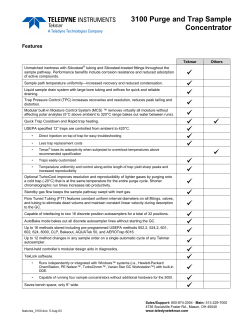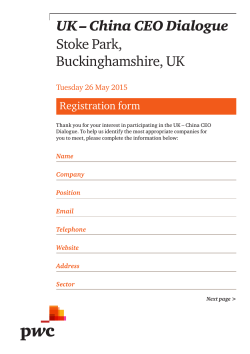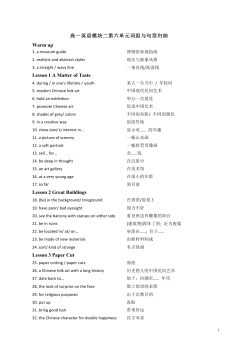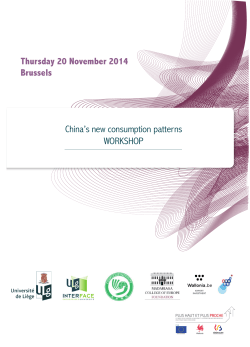
May 15 Bulletin - Institute for China
ICAS Institute for China-America Studies www.chinaus-icas.org ICAS Bulletin A Bimonthly Survey of Research and Analysis on China-US Relations May 15, 2015 Twice a month, the ICAS Bulletin updates a global audience on American perspectives regarding the world’s most important bilateral relationship. Research papers, journal articles, and other prominent work published in the US are listed here alongside information about events at US-based institutions. Publications A US-China Grand Bargain? The Hard Choice between Military Competition and Accommodation Charles Glaser International Security 39:4, Spring 2015 http://www.mitpressjournals.org/doi/abs/10.1162/ISEC_a_00199#.VUuCfflVhBc This article evaluates three options presented to the US in Asia: continuation of “the rebalance,” unilateral accommodation to China, and a grand bargain strategy in which the US ends its commitments to Taiwan in exchange for the peaceful resolution of the maritime disputes and an official acceptance of the United States’ long-term security role in Asia. Glaser finds that on balance each option presents certain advantages, but that a grand bargain approach would do the most to ensure US security. Tides of Change: Taiwan’s Evolving Position in the South China Sea and Why Others Should Take Notice Lynn Kuok Brookings Institute, May 2015 http://www.brookings.edu/research/papers/2015/05/taiwan-south-china-sea-kuok 1 Kuok argues that Taiwan has taken productive steps lately to help ease tensions in the East and South China seas, and that such measures should be embraced by both China and ASEAN members. These steps include working to clarify how the ROC/PRC dash-line claim conforms to UNCLOS and promotion of joint development in the East China Sea. Kuok claims that Taiwan can conceivably be a constructive partner in the region without violating China’s “one China” policy or inflaming cross-strait relations. China Now Article Series, Foreign Affairs, May/June 2015 https://www.foreignaffairs.com/issues/2015/94/3 This article series examines China’s economic future and aspects of Chinese nationalism. China’s Expanding African Relations: Implications for US National Security Lloyd Thrall RAND Corporation, 2015 http://www.rand.org/pubs/research_reports/RR905.html This report describes the multiple interests China has in Africa, and their impact on American interests. It finds that Chinese influence in Africa will continue to grow, including over time developing “minimally invasive” capabilities for securing Chinese citizens and assets on the continent. The report finds that US suspicions of Chinese activities in Africa are sometimes overblown, and that China’s relationships with African states are neither a strategic threat to the US, nor will result in China becoming a dominant force in Africa. Consequently, the author recommends separating the US-China relationship in Africa from the rest of the strategic relationship and pursuing opportunities to cooperate, including AFRICOM/PLA cooperation. China and America: Sleepwalking to War? Christopher Layne The National Interest, May/June 2015 http://nationalinterest.org/feature/china-america-sleepwalking-war-12685 Christopher Layne, a long-time critic of US overextension, compares the shift in power currently underway between the US and China to the eve of the First World War (the title of this article is an allusion to Christopher Clark’s book on that topic). Layne argues that more attention be paid to the elements of prestige or standing and ideological competition in our assessments of power transitions. He warns that on both of these fronts the US-China relationship is competitive, with the US being unwilling to recognize China’s new status or accept the legitimacy of non-democratic 2 powers as international actors. Layne does not, however, believe that conflict is inevitable. He recommends that Americans work to counter Chinese perceptions that the US is trying to block its growth. To Layne this includes scaling back US attempts to maintain predominance in East Asia, a status that “contributes little, if anything, to US security.” Events at US-based Institutions Is The American Century Over? Book Event with Joseph Nye Woodrow Wilson International Center for Scholars, April 21, 2015 http://www.wilsoncenter.org/event/the-american-century-over Joseph Nye discussed points from his book regarding the character of the shift in relative power between the US and China over the next few decades. He contends that if the US can remain engaged in its global alliances, it will maintain its global position into the future, even in a new multipolar world. Nye claims that the US benefits from favorable demographic trends, a sophisticated economy, and energy independence in ways that China does not. He finds that in contrast to the US, China faces an economy that is short on innovation, will face increasing pressure for political reforms, and has a lack of “soft power,” especially in its own region. Because of the path of China’s development, Nye believes that the US and China have time to develop a manageable relationship. As such, the greatest challenge to the United States is not the rise of China, but “entropy” in the United States’ alliances and global governance mechanisms. At the policy level, Nye criticized the Obama administration’s handling of the AIIB issue, encouraged climate change to be part of the substance of Xi’s “new model” politics, and encouraged US policymakers to get China more involved in producing global public goods. The US-China Relationship in an Evolving Global Economic Order Center for Strategic and International Studies, April 29, 2015 http://csis.org/event/us-china-relationship-evolving-global-economic-order This discussion featured Chen Dongxiao of SIIS, Fang Jin of the State Council’s Development Research Council, former US officials Evan Feigenbaum and Clay Lowery, and Nathan Sheets, Under Secretary for International Affairs at the United States Treasury Department. Issues discussed were China’s dissatisfaction with current global financial regime, the origins of tensions over the AIIB, and the future of the Renminbi as a global currency. Under Secretary Sheets delivered a talk on the benefits of the Strategic and Economic Dialogue (S&ED) between Beijing and Washington. He described this process as being more than a yearly event, but rather a near-daily mechanism for productive discussion on a range of bilateral issues. Chinese Thinking on Nuclear Weapons 3 Carnegie Endowment for International Peace, May 11, 2015 http://carnegieendowment.org/2015/05/11/chinese-thinking-on-nuclearweapons/i86f Li Bin of Carnegie hosted Xu Weidi from PLA’s National Defense University and Wu Riqiang from Renmin University. The three discussed many differences in nuclear thinking between the US and China, including the lack of a US commitment to a “no first use” policy, China’s strategic reliance on a lack of transparency about secondstrike capabilities, and the difficulty of incorporating China into current Russia/US arms reduction processes due to China’s vastly different operational concepts and small numbers of weapons. Prof. Wu indicated that to many Chinese the American refusal to make even a modified “no first use” proclamation indicates that the US relies on strategic ambiguity as a tool of coercive diplomacy. Meeting China Halfway: Defusing the Emerging US-China Rivalry Brookings Institute, May 12, 2015 http://www.brookings.edu/events/2015/05/12-defusing-us-china-rivalry Lyle Goldstein presented the major findings and recommendations from his new book. Goldstein shared his alarm at the rhetoric in both the US and China, and characterized the relationship as entering into an “escalation spiral.” His book puts forward a series of recommendations intended to counter this escalation via the mechanism of “cooperation spirals” that address problems of strategic mistrust. These recommendations include serious reconfigurations of political relationships in the Asia-Pacific region. Michael McDevitt of CNA and former ambassador J. Stapleton Roy commented on the book. The Future of American Predominance in the Western Pacific Carnegie Endowment for International Peace, May 13, 2015 http://carnegieendowment.org/2015/05/13/future-of-american-predominance-inwestern-pacific/i872 Michael Swaine made his case for having the United States drastically alter its security commitments in East Asia, and Ashley Tellis provided the counterpoint by recommending that the US intensify its attempts to maintain military preponderance. Both arguments have been published and were reviewed in the previous ICAS Bulletin. They are available at Carnegie’s website on the link above. 4 Commentary: The Problem with the “Thucydides Trap” By Alek Chance Since Graham Allison coined the phrase a few years ago, few American discussions of the US-China relationship go by without somebody bringing up the idea of “Thucydides’ Trap.” Even President Xi has adopted the phrase, urging the US and China to work together in avoiding it. What is suggested by this “trap” is the notion that conflict is exceedingly likely when a rising power approaches parity with an established power. In other words, the trap is shorthand for what Western political scientists call power transition theory. Modern expressions of this theory are found most notably in the work of A.F.K. Organski and Jacek Kugler and, separately, Robert Gilpin, who based his argument on a study of Thucydides’ account of the Peloponnesian war. That this notion is so often used to frame US-China relations raises concerns not only about how we derive and apply lessons from history, but also about the manner in which political science concepts are employed by analysts, commentators, and policymakers. In testimony to the US Senate Armed Services Committee last month, Allison reported that according to his findings, “In 12 of 16 cases in the past 500 years when a rising power challenged a ruling power, the outcome was war.” He then goes on to cite Thucydides’ assessment that the rise of Athens instilled fear in the dominant Spartans, which pushed them to war. But this account is in fact one of two distinct (though not mutually exclusive) explanations for why power transitions result in conflict. The other, promoted by Organski and Kugler, is more oriented around the rising power’s dissatisfaction with the status-quo and its inability to enjoy the fruits of a system built around the established power. The fact that both of these patterns might be suggested by the Thucydides trap idea gives cause for both the rising power and the established power to fear the other. As Michael Swaine of the Carnegie Endowment recently said, “bad historical analogies” and “faulty theories” on this front have led some parties in both China and the US to promote more aggressive stances towards the other. Before allowing an idea like power transition theory to become a framing concept for US-China relations, numerous caveats must be acknowledged. From a quantitative perspective, the historical record tells us different things about power transitions depending on how one quantifies power, and it must be noted that some studies find no such phenomenon as a power transition conflict at all (Richard Ned Lebow is especially critical of the idea). Moreover, many power transition theories find the majority of their examples in conflicts within modern European history, an era full of the glorification of militarism and an explicitly institutionalized realpolitik. This in turn highlights how many of the conflicts that some attribute to shifts in 5 relative power can be explained in numerous ways. The Second World War, for example, appears on most lists of power transition conflicts, but to envision the competition between Nazi Germany and Great Britain as essentially being a question of differential economic growth is to ignore other obviously significant factors. More productive than quibbling over the historical record is making an assessment of the assumptions that underpin the idea of the Thucydides trap. These assumptions are that established powers are capable of significantly imposing their preferences on the international system, that they do this in a way that primarily benefits themselves and to the detriment of other states, and that this distribution of goods is either so intolerable to the rising power or so beneficial to the established power that one or both is willing to engage in conflict over it. Looking at the elements of this trap can both give cause for cautious optimism and suggest ways to avoid it. While the United States has certainly exercised considerable influence in creating the current world order and derives many benefits from it, it falls short of exercising the sort of dominance that is presupposed by power transition theory. The contemporary world order is neither zero-sum in its distribution of goods nor does the most powerful state unilaterally dictate the rules of the road. Many political scientists, Charles Kupchan, for example, have argued that the ability of great powers to impose their preferences will only decline further in the future. The institutions associated with the US-led world order need to adjust to new realities and become more inclusive, but they are not in principle mere instruments of American power. As G. John Ikenberry suggests, these institutions can continue to provide a stable order in a more inclusive manner while becoming “less American.” If such a transformation could come about, it would further diminish the incentive for rising powers to coercively challenge this order or create parallel orders, weakening the trap even more. This process would no doubt be difficult, but thinking in these terms removes the sense urgency and mutual insecurity implied by the narrative of power transitions and traps. Obvious immediate steps towards affirming a more genuinely inclusive and rules-based order should include the US Congress ratifying UNCLOS and approving the IMF quota reforms. In fairness to Graham Allison, the “Thucydides trap” coinage was not meant to engender sense of fatalism, but merely to impress upon American audiences the great geopolitical significance of China’s rise. However, without elaborating upon the mechanisms that allegedly operate it—the particular clashes of interests likely to occur between different kinds of states—the idea of the trap only serves to reinforce an abstract sense of competitiveness in international relations that is divorced from the actual motivations of real states. Everyone studying the US-China relationship today should be alive not only to the particularities of US and Chinese interests, but also to ongoing and potential transformations in the character of international politics. As a heuristic device, the “Thucydides trap” doesn’t offer any particular help on either count. 6
© Copyright 2025








